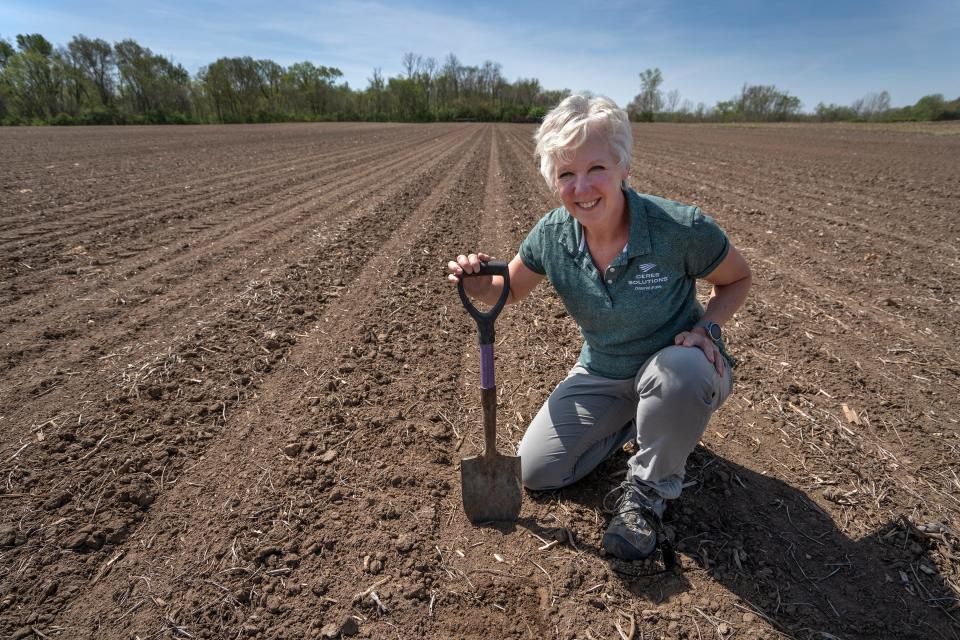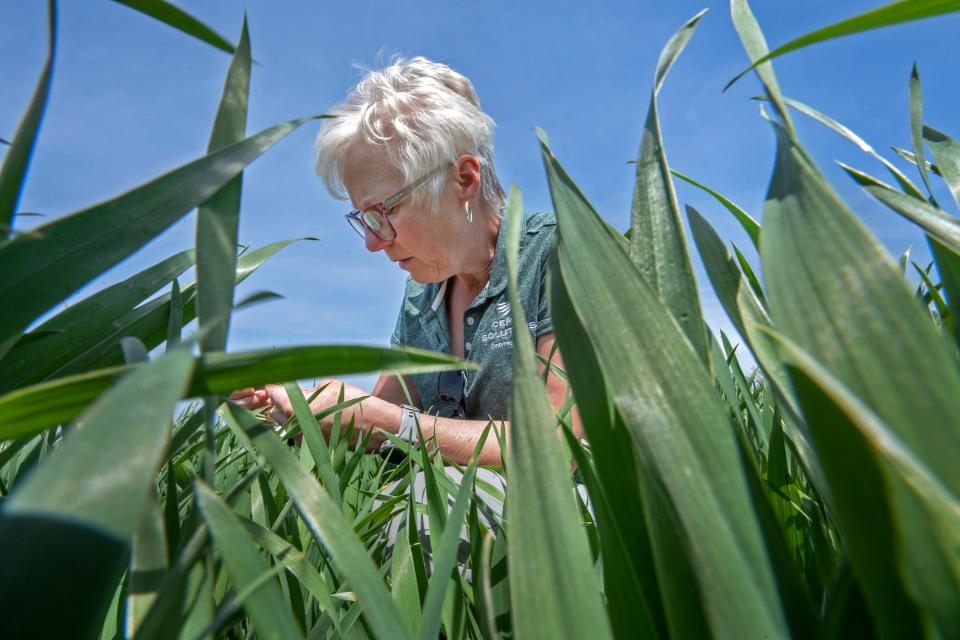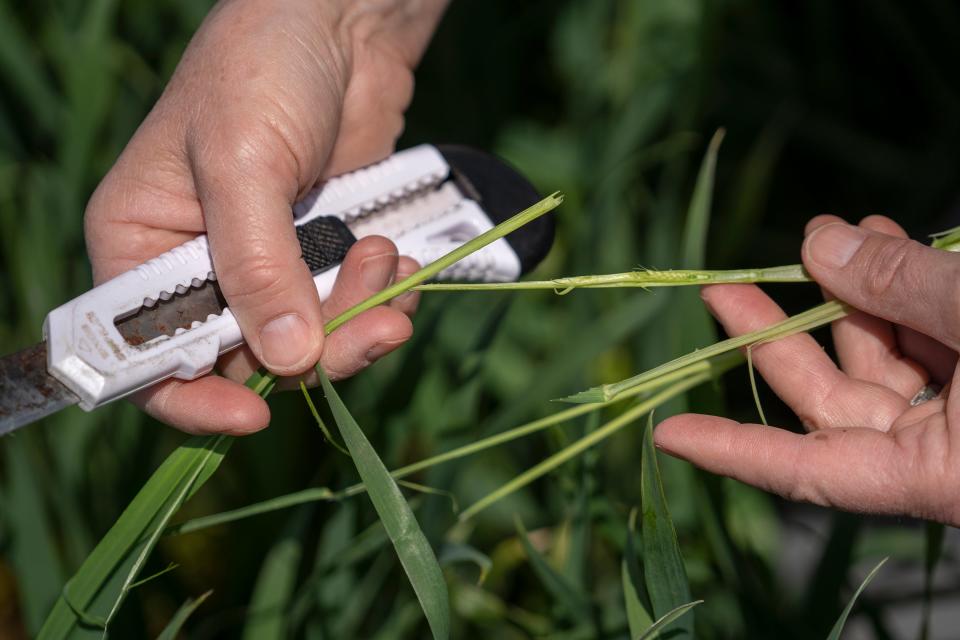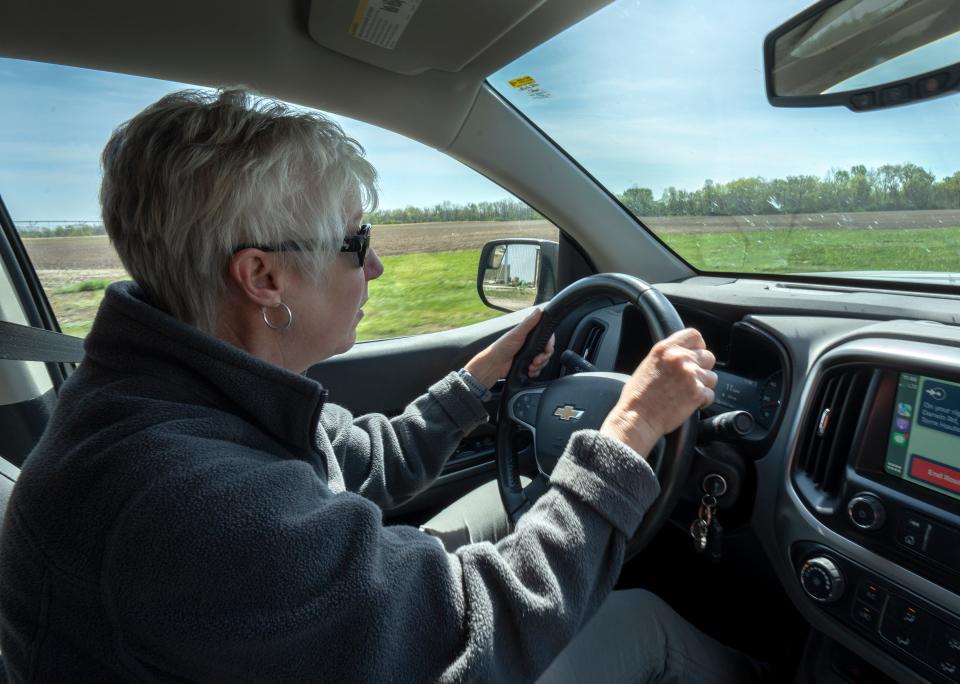Agronomist works extra hard to take 'femaleness' out of her interactions with farmers
Betsy Bower knew from the time she was five that she wanted to do something in agriculture. Both of her grandparents had working farms, and her dad worked at the local farm services cooperative selling crop nutrition and protection products.
Farming was what she knew and, at first, she thought maybe she'd do something with animals. But she didn't like the inevitability of dealing with their deaths.
So she turned to plants.
Fifty years later, Bower has turned her interest in plants into a successful and rewarding career helping farmers figure out how best to grow them.

Bower is an agronomist, defined as an expert in the science of soil management and crop production. But in her words, it’s about building relationships and helping farmers solve problems, from weed control and crop nutrition to when and how much to irrigate. It's a job she loves and takes seriously.
“It’s walking their fields and caring about their farm as much as they do,” Bower said. “Farmers can sniff that out.”
The Indiana native has worked for nearly 30 years for an ag retail firm called Ceres Solutions Cooperative, which provides most products farmers need to plant, grow and protect their crops.
Women in agriculture: 'I'm not a woman farmer. I'm just a farmer.'
Over her career she has built a dedicated base of farmers, ones who take her advice “as gospel” and trust her.
But it wasn’t always that way.
Bower attended Purdue University where she got a degree in agronomy. She then followed that up with a Masters degree from Nebraska University.

She could have gotten a job without the advanced degree, Bower said, but she wanted to have as much in-depth knowledge as possible. Bower believed she needed those credentials to convince what she knew would be skeptical farmers to trust the advice of a woman.
“When I finally had my degrees and was ready to step into an ag retailer firm, my parents and grandparents didn’t know how it was going to go because it had been a male-focused field,” Bower said. “But going into it I thought ‘I’m just a person, I’m not a female.’ I thought that I’m just a person here to help figure out what’s going on with your field.”
Women in agriculture: Two Indiana sisters follow in agricultural footsteps of their trailblazing parents
That’s what she does — and the approach has worked well for Bower.
She started out working one-on-one with farmers, but she also oversees other agronomist specialists and will review their conclusions and guidance. In both roles, she walks the fields, she collects soil samples and she makes recommendations.

Early on, she said some of the farmers she worked with would call her “that little girl from the co-op.” She knew they didn’t mean any offense, they just weren't used to seeing a woman in that role.
“If you wanted to make it," she said, "you had to let some of those little things go.”
On a more practical note, she also figured out quickly to wear tall rubber boots and heavy socks because she would spend hours outside with the farmers in their fields or their shop. Sometimes it was particularly cold, or hot, or wet — and she knew they were testing her.
But “after I’d proved myself,” Bower said the farmers finally started inviting her inside to talk through her analysis and recommendations.
“What’s so fun about farmers and customers, is they are going to figure out if you’ve got what it takes to make it,” she said. “What they soon figured out was that I had a lot of technical information they needed and a way of explaining it that they understood.”
Grown IN Indiana: We are known as a corn and soy state. But there is much more to farming in Indiana.
Bower said her work is all about building relationships, which sometimes can take years. She is deeply focused and invested both in the farmers and individuals as well as their success. The farmers she works with have come to see that. She may not know much about the new piece of equipment a farmer is gushing about, Bower joked, but she takes an interest.
Despite the initial hurdles that sometimes cropped up earlier in her career, Bower said she actually finds being female in her industry to be unique and “not necessarily a negative.” That’s because she thinks farmers might be more open with her.
“When I’m visiting with a farmer," she said, "they feel comfortable and don’t have to have the bravado.”

Bower said that 90% of her job is following through. When working on a problem, she will bring farmers a variety of solutions and help them think through things a little differently.
She helps the farmer make a decision, “but then he doesn’t worry about it anymore, but I keep worrying about it for them.”
At her company, there are more women crop specialists than ever before, Bower said. She also sees more women in Purdue’s agronomy department when she visits. She can see it all changing, which she said is a good thing.
“I have some male counterparts that tell me I work harder than any man they know,” Bower said. “It’s to take the femaleness out of everything and to just be that person who is steady and reliable.”
Women in agriculture: Indiana agriculture student wants to be the role model she needed when she was younger
She hopes other women are able to do the same.
“For women who even think that they want to work in agriculture,” she said, “the sky’s the limit.”
Call IndyStar reporter Sarah Bowman at 317-444-6129 or email at sarah.bowman@indystar.com. Follow her on Twitter and Facebook: @IndyStarSarah. Connect with IndyStar’s environmental reporters: Join The Scrub on Facebook.
IndyStar's environmental reporting project is made possible through the generous support of the nonprofit Nina Mason Pulliam Charitable Trust.
This article originally appeared on Indianapolis Star: Female agronomist proves herself to farmers through years of hard work

